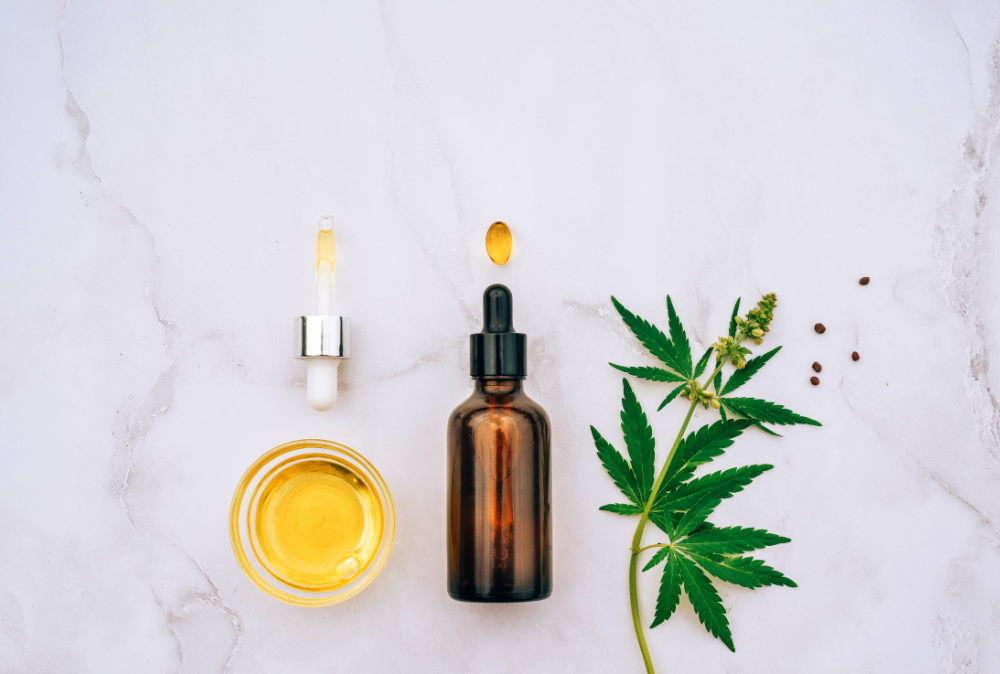
Cannabis is increasingly recognized for its potential therapeutic benefits, and many people turn to THC for anxiety relief. However, the relationship between THC and anxiety is complex, as the effects can vary based on dosage, strain, and individual tolerance. If you're considering cannabis for anxiety management, it’s essential to understand how THC interacts with the body and what factors to keep in mind to make sure you have a positive experience.
Tetrahydrocannabinol (THC) is the primary psychoactive compound in cannabis. It interacts with the endocannabinoid system (ECS) by binding to CB1 receptors in the brain, influencing mood, stress response, and relaxation. A recent study suggests that low doses of THC can have anti-anxiety effects, while high doses may trigger or worsen anxiety due to overstimulation of these receptors.
1. Start with a Low Dose
Dosage is critical when treating anxiety with THC. Many users find that microdosing — taking very small amounts of THC (2.5–5 mg) — can provide relief without the unwanted side effects of paranoia or increased heart rate. Products like low-dose edibles, tinctures, or vaporizers allow for better control over intake.
2. Consider THC-to-CBD Ratio
CBD (cannabidiol), another key compound in cannabis, has been shown to counteract some of THC’s anxiety-inducing effects. Strains or products with a balanced CBD-to-THC ratio (like a 1:1 or higher CBD content) may be more effective for anxiety relief than high-THC options. CBD has anti-anxiety properties that may help regulate the effects of THC.
3. Choose the Right Strain
Cannabis strains can have vastly different effects. Indica-dominant strains tend to promote relaxation, while Sativa strains may be more stimulating and potentially worsen anxiety. Many users report success with hybrid strains that balance calming and uplifting effects. Popular choices for anxiety relief include:
4. Method of Consumption Matters
How you consume THC affects how quickly and intensely it impacts anxiety.
If you’re new to cannabis, or even new to using it for anxiety, starting with tinctures or low-dose edibles may be the best approach.
5. Set and Setting
Your environment plays a crucial role in how THC affects your anxiety. A calm, comfortable setting can enhance relaxation, while a stressful environment may heighten anxiety. Additionally, practicing mindfulness or deep breathing techniques alongside cannabis use can help maximize its benefits.
6. Monitor and Adjust as Needed
Everyone reacts differently to THC. Keeping a cannabis journal to track your dose, strain, method of consumption, and effects can help you determine what works best for your anxiety relief.
While many people find using THC for anxiety to help, others may experience negative effects, especially at higher doses. Potential risks include:
If you experience heightened anxiety, consider taking CBD or using grounding techniques like breathing exercises to help regulate your response.
THC can be a helpful tool to manage anxiety, but it’s not a one-size-fits-all solution. Starting with a low dose, balancing THC with CBD, and choosing the right strain and consumption method can all make or break your chances of a positive experience.
Before incorporating cannabis into your anxiety management routine, consult with a trained and educated Qualified Medical Provider. They can help you find a regimen that works for you, especially if you have a history of anxiety disorders or are taking medications that may interact with THC.
By approaching this treatment with mindfulness and caution, you can find the right balance to support your mental well-being. For more information or to see if you qualify for a Medical Cannabis Card in Utah, schedule an appointment with us today.
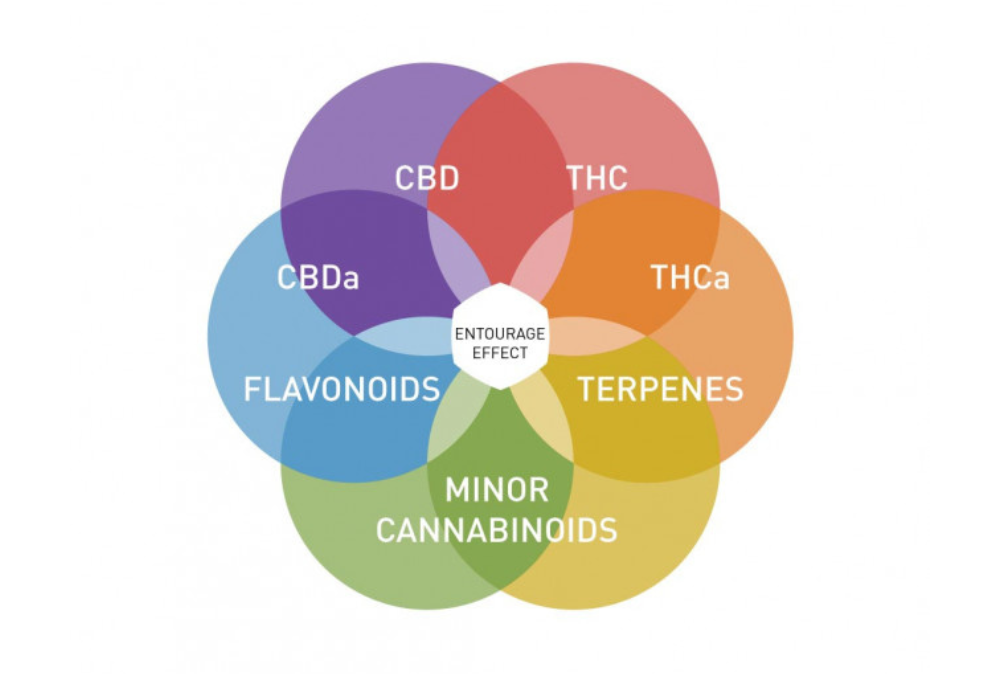
Cannabis is more than just THC and CBD. While these two cannabinoids are most widely recognized, the true therapeutic power of cannabis lies in how all of its components work together. We call this the entourage effect. Follow along as we dive into the entourage effect, how different compounds work together in whole plant medicine, and why it’s important for both medical and recreational cannabis users to understand.
The entourage effect is a term used to describe how the different compounds in cannabis — such as cannabinoids, terpenes, and flavonoids — work together to enhance or modify each other's effects. Instead of relying solely on one isolated cannabinoid, the entourage effect highlights how the whole plant, with all its naturally occurring compounds, provides a broader range of therapeutic effects than isolated compounds alone.
Cannabis contains hundreds of cannabinoids, each with unique effects. The most common include:
Each cannabinoid affects the body’s endocannabinoid system (ECS) differently, but when used together, they can produce more therapeutic benefits. This synergy is the key principle behind the entourage effect.
In addition to cannabinoids, terpenes play a significant role in the entourage effect. Terpenes are the aromatic compounds found in cannabis (and other plants) responsible for the smell and flavor. In addition, they also have their own therapeutic properties and interact with other compounds to enhance their effects.
For example:
When combined with cannabinoids, terpenes can modify how cannabis affects the body, further demonstrating the importance of using whole-plant medicine.
Whole-plant medicine uses cannabis in its natural, unaltered form, incorporating all cannabinoids, terpenes, and other compounds. Unlike isolated cannabinoid products (such as pure THC or CBD oils), whole-plant cannabis offers a more comprehensive therapeutic effect.
The benefits of whole-plant cannabis include:
Cannabinoids interact with the body’s endocannabinoid system (ECS), which regulates various physiological processes like pain, mood, and immune response. The ECS has two main types of receptors: CB1 and CB2. CB1 receptors are mainly found in the brain and central nervous system, while CB2 receptors are located in the peripheral nervous system and immune cells.
When cannabinoids like THC and CBD are consumed, they interact with these receptors to produce various effects. THC binds especially well to CB1 receptors, which causes the characteristic "high" sensation. On the other hand, CBD interacts more indirectly with both CB1 and CB2 receptors, potentially moderating the effects of THC.
The entourage effect occurs when multiple cannabinoids and terpenes work together to influence the ECS. For example, CBD can reduce the psychoactive effects of THC, making it easier for users to tolerate higher doses without feeling overly intoxicated. This interaction leads to a more balanced experience, both therapeutically and in terms of side effects.
To experience the full benefits of the entourage effect, it’s important to choose whole-plant cannabis products that provide a broad spectrum of cannabinoids and terpenes. Here’s what to look for:
The entourage effect underscores the importance of using whole-plant cannabis for therapeutic purposes. By understanding how cannabinoids, terpenes, and other compounds work together, users can maximize the therapeutic benefits of cannabis. Whether you're using cannabis for chronic pain, anxiety, or sleep issues, whole-plant cannabis offers a more balanced, holistic approach to wellness.
Embracing the entourage effect means tapping into the full potential of cannabis as a natural remedy. If you’re new to cannabis, start with full-spectrum products to experience the combined benefits of cannabinoids and terpenes. For more information on cannabinoids and the entourage effect, explore our website or schedule an appointment with one of our canna-expert QMPs.
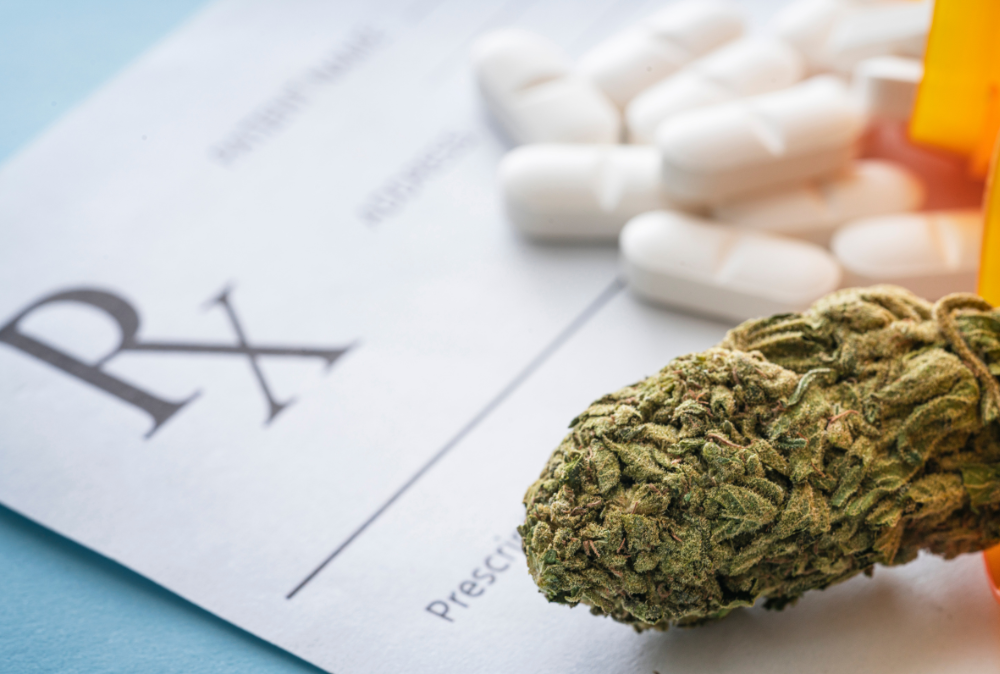
As more folks experiment with cannabis for mental health support, it’s crucial to understand how marijuana and antidepressants interact. While cannabis is known for its calming effects, combining it with depression medications may lead to unintended results. Follow along as we explore the potential interactions between cannabis and antidepressants to help patients make informed decisions.
Antidepressants work by balancing neurotransmitters, like serotonin and dopamine, in the brain. Marijuana, specifically cannabinoids like THC and CBD, can also affect these neurotransmitter systems. The combination of marijuana and antidepressants may interfere with how effective your medication is, increase side effects, or lead to unexpected health risks.
When it comes to your health, it’s best to avoid unnecessary risks. Before using cannabis with your antidepressants:
The interaction between cannabis and depression medication varies depending on the type of medication and the person’s individual response. While some combinations may have minimal effects, others post significant risks. Keep communication open with your healthcare providers to ensure safe and effective mental health treatment. To chat further about adding cannabis to your mental health regimen, schedule an appointment with the KindlyMD Care Team today. In one appointment, you’ll be preesented with the opportunity to discuss cannabis (and get a Medical Cannabis Card recommendation, if you qualify), your prescription medication, and meet with a Behavioral Health Clinician to monitor your overall mental health and wellbeing. Together, we’ll find the perfect combination to get you feeling better.

When cold and flu season strikes, many people turn to traditional remedies like tea, soup, and over-the-counter medications to feel better. But for those who regularly use cannabis to feel better, a common question arises: Should you be consuming or smoking weed while you’re sick? While cannabis offers potential benefits such as pain relief, improved sleep, and nausea reduction, it’s essential to understand how it interacts with your body during illness so you know what you're in for.
If you want to use cannabis on your sick day but don't want to smoke or vape, consider these methods to minimize irritation and maximize benefits:
While cannabis may offer symptom relief for colds and the flu, it’s important to be mindful of how you consume it so it doesn't interfere with your healing journey. It's best to avoid smoking or vaping if you have respiratory symptoms, and make sure to stay hydrated and listen to your body. If symptoms persist or worsen, consult a healthcare professional for guidance.
Have you tried using cannabis or smoking weed while you’re sick? How did it go? Share your experiences and thoughts in the comments below!
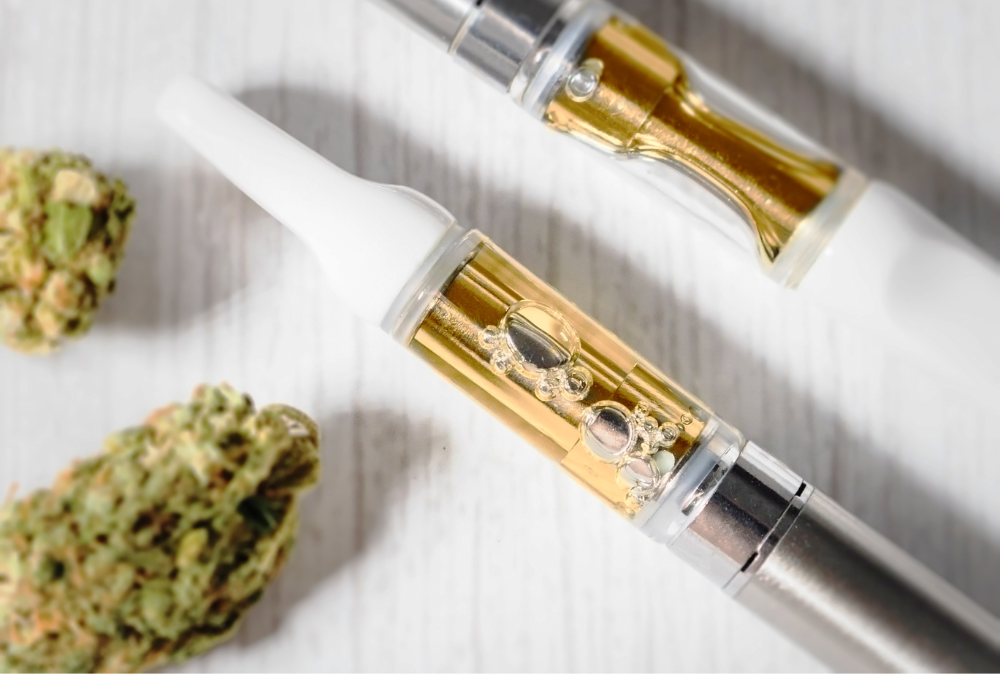
If there’s one thing shaking up the cannabis world, it’s the rise of weed pens. You may know them as vape cartridges, carts, pens, vapes, or our personal favorite moniker, the Penjamin. These sleek, portable devices have quickly become a favorite among cannabis enthusiasts, and it’s easy to see why. Whether you’re new to cannabis or a seasoned pro, the weed pen has something for everyone.
The popularity of the weed pen isn’t just a fluke — it’s a mix of convenience, innovation, and changing preferences. Here’s why everyone’s buzzing about them:
The rise of the weed pen is more than just a trend — it’s a reflection of how cannabis culture is evolving. People are moving away from traditional methods and looking for options that fit their lifestyles. Over the past few years, sales have surged, with some reports showing double-digit growth year after year. In 2021, vapor pen sales increased by over 28%, and the trend shows no signs of slowing down. As cannabis legalization spreads, the demand for weed pens is only expected to grow.
The weed pen has cemented itself as a staple in both the medical and recreational cannabis space. Its popularity is driven by its ability to adapt to modern lifestyles, offering a perfect mix of convenience, discretion, and innovation. As technology continues to improve, we can only expect weed pens to get even better — and even more popular.
If you haven’t tried a weed pen yet, now’s the perfect time to see what all the hype is about. Whether you’re looking for a discreet way to enjoy cannabis or just want to try something new, the weed pen is ready to deliver. If you’re in Utah with a qualifying medical condition and interested in seeing about vape pens for yourself, we’ve got you. Schedule today with one of our QMPs to see if a Utah Medical Marijuana Card is for you.

Cannabis hyperemesis syndrome (CHS) is a relatively new condition that has emerged as cannabis use has become more widespread. While cannabis is often touted for its therapeutic benefits, particularly in managing chronic pain, anxiety, and nausea, it can also lead to a paradoxical effect in some users — cannabis hyperemesis syndrome. In this article, we dive deep into cannabis hyperemesis syndrome, symptoms, causes, and potential treatments, to help you understand this rare but serious condition.
Cannabis hyperemesis syndrome (CHS) is a condition characterized by severe, persistent nausea and vomiting in people who regularly use cannabis. The symptoms typically develop in individuals who have been using cannabis for a long period, and who consume high doses of THC, the psychoactive compound in marijuana. It's not clear why some suffer from CHS while others don't.
While cannabis is commonly used to alleviate nausea, CHS is a contradictory condition where the opposite effect occurs. People with CHS experience cycles of intense vomiting that can last for hours or even days. Interestingly, hot water (baths or showers) often temporarily alleviates symptoms, though the underlying cause remains unclear.
The hallmark symptoms of cannabis hyperemesis syndrome include:
The exact cause of cannabis hyperemesis syndrome is not fully understood, but it is believed to be related to the way cannabis interacts with the body’s endocannabinoid system, which regulates a range of physiological processes, including mood, appetite, and nausea.
Some key factors that may contribute to the development of CHS include:
Diagnosing CHS can be challenging. Its symptoms can mimic those of other gastrointestinal disorders like gastroenteritis, pancreatitis, or cyclic vomiting syndrome. A healthcare provider typically diagnoses CHS based on a combination of factors:
The primary and most effective treatment for cannabis hyperemesis syndrome is to discontinue cannabis use. After cannabis cessation, vomiting and nausea often subside, leading to recovery in a matter of days.
However, there are several steps that one may take to manage symptoms during a CHS episode:
The best way to prevent cannabis hyperemesis syndrome is to limit cannabis use. Many of us do not need large amounts of THC to feel relief from Medical Cannabis. For individuals who use cannabis medicinally, it is important to monitor consumption closely and to discuss any potential side effects with a healthcare provider. For recreational users, moderation is key — especially if they have a history of gastrointestinal issues or have been using cannabis for years. Finding your "just right" dose or lowering your tolerance to THC may help prevent CHS.
Cannabis hyperemesis syndrome is a rare but serious condition that affects long-term, heavy cannabis users, causing episodes of severe nausea, vomiting, and abdominal discomfort. If you or someone you know is experiencing these symptoms, it is important to seek medical advice and stop using cannabis to prevent further complications. With proper treatment and a commitment to discontinuing cannabis use, most individuals with CHS can recover fully. For helpful Medical Cannabis tips and tricks for use, check out our educational guides or schedule an appointment at any of our clinics to chat with a Qualified Medical Provider.
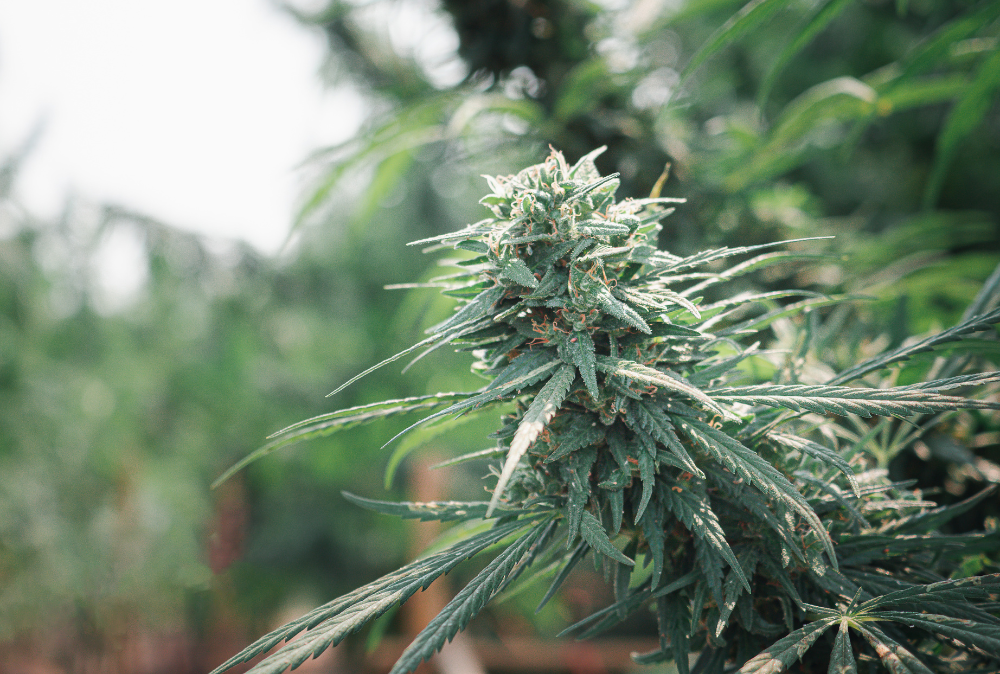
Cannabis use has become increasingly common, with many people using marijuana for recreational and medicinal purposes. However, if you’ve decided to quit or reduce your cannabis consumption in the new year, it's important to understand the process involved. Quitting cannabis isn't always as simple as just stopping use — there can be physical and psychological challenges that make you quite uncomfortable. In this article, we’ll explore what you need to know about marijuana withdrawal and how long cannabis stays in your system.
When you use cannabis regularly, your body becomes accustomed to the active compounds in marijuana, especially tetrahydrocannabinol (THC). THC is the psychoactive ingredient in marijuana that produces a “high” feeling. When you suddenly stop using cannabis, your body may struggle to readjust, leading to what is known as marijuana withdrawal.
Marijuana withdrawal occurs when the body reacts to the absence of THC. Unlike withdrawal from substances like alcohol or opioids, cannabis withdrawal symptoms are generally less severe (and not fatal!) but can still be uncomfortable and challenging to manage. Withdrawal can happen after even moderate use of cannabis, especially if you’ve been using it frequently over an extended period.
If you’ve been using marijuana regularly and decide to quit, you may experience a range of weed withdrawal symptoms. These symptoms vary depending on the individual and the extent of their cannabis use. However, there are a few common withdrawal symptoms that many people report:
One of the most important factors to consider when quitting cannabis is how long marijuana stays in your system. The answer depends on several factors, including how often you use cannabis, the amount you consume, your metabolism, and the method of use.
The reason THC stays in the body for a long time is that it is fat-soluble, meaning it binds to fat cells and can be stored in the body. This is why people who use cannabis frequently or in large amounts may experience a longer duration of withdrawal symptoms compared to occasional users.
Got a drug test coming up? Here are a few tips to potentially rid your system of THC quickly.
Weed withdrawal symptoms can vary in intensity and duration depending on the individual and their level of cannabis use. On average, most people experience symptoms for about 1 to 2 weeks after quitting. However, some symptoms, like irritability and cravings, can last longer.
Quitting cannabis can be challenging, but there are several ways to manage weed withdrawal symptoms and make the process easier:
Whether you’re quitting permanently or simply taking a tolerance break to reset your tolerance, quitting cannabis is a personal journey that can come with its own set of challenges. While marijuana withdrawal and weed withdrawal symptoms can be uncomfortable, they are temporary, not fatal, can be successfully managed with the right strategy. Understanding how long marijuana stays in your system and what to expect during the withdrawal process can help prepare you for a smoother transition.
If you’re considering quitting or have already stopped using cannabis and are struggling with withdrawal, it’s always a good idea to talk to a healthcare professional for guidance. The folks here at UtahMarijuana.org and our affiliated clinic, KindlyMD, are here to help. Schedule with one of our Medical Cannabis providers today. With the right tools and mindset, you can navigate the withdrawal process and move toward a cannabis-free lifestyle.

The Utahmarijuana.org website is part of a larger organization of professionals and support staff who believe wholeheartedly in the benefits of promoting Medical Cannabis use among patients whose conditions or symptoms can be improved by it. Education is a big part of what we do. Along with our clinics, operating under the KindlyMD brand, we seek to provide as much information as possible.
To us, patient education isn't just another marketing avenue. Rather, it is critical to our mission. We want to help patients make the best decisions for them. And in order for them to participate intelligently in the decision-making process, they need to be informed.
We focus a lot of our educational efforts on efficacy. Simply put, we want patients to understand what Medical Cannabis can and cannot do. We want them to understand that it is not a miracle drug capable of curing everything under the sun. Yet at the same time, we also want them to know that Medical Cannabis is particularly good at alleviating the symptoms of more than a dozen conditions.
We believe it is important that patients understand the difference between symptom management and cure. Why? Because Medical Cannabis doesn't cure anything – at least as far as we know. When a doctor, physician assistant, or nurse practitioner recommends it, cannabis is intended to help alleviate symptoms. That is not a bad thing, by the way. Prescription pain medications do the exact same thing; they relieve the symptoms of pain without actually curing the underlying illness. And when a cure is not an option, our patient’s quality of life takes center stage.
Medical Cannabis education does not end with efficacy. There's so much more patients need to learn. Take dosage and delivery method. Dosage equates to the total amount of medicine delivered into the body when a person uses Medical Cannabis. We believe it is best that patients take the smallest dose possible, especially to start. We always recommend starting slowly, gradually increasing dose until the patient finds that sweet spot of relief.
As for delivery methods, they can have a significant impact on how a patient feels. Vaping and dry heating deliver maximum dosage very quickly. THC gets into the bloodstream almost instantly, then goes to work to provide relief. However, the medication's effects tend to wear off more quickly.
An edible product, like a tablet or gummy, takes longer to start working because the active ingredients need to make their way through the digestive tract. That means edibles do not work as quickly as vapes and dry heating. On the other hand, symptom relief tends to be more consistent and long lasting once the medications do kick in.
These are all things patients need to know. Without such knowledge, how can they truly understand the best way to use Medical Cannabis effectively?
Although we do not provide legal advice, compliance remains a valuable component of our educational efforts. Utah's Medical Cannabis law is both clear and strict. Things need to be done by the book if one hopes to continue using THC medications legally.
Our clinics need to comply in order to keep their licenses. Each of our Qualified Medical Providers (QMPs) must abide by the rules pertaining to their licenses. When everybody follows the law, better decisions are made.
The truth of the matter is that Medical Cannabis is not a simple topic. There is a lot to know about it. That being the case, we believe education is critical to helping patients get the most from their medicines. It’s always a good idea to consult our Medical Cannabis guides or your provider with further questions.

Did you know that there are now more than 83,000 Medical Cannabis Card holders in Utah? Thousands of people are joining the program every quarter. That tells us some important things, including the fact that there may be people reading this post who have not yet gotten their cards despite wanting to do so. If you are one of them, what do you know about the state's electronic verification system (EVS)?
We ask the question for a very important reason: getting a Medical Cannabis Card requires interacting with the EVS. The EVS is the heart and soul of Medical Cannabis administration in Utah. But no worries, it is nothing to be afraid of.
You can use a smartphone, right? You know how to browse websites and sign up for accounts as well. With just basic computer and phone skills, you can do what's necessary in the EVS to get and renew your Medical Cannabis Card.
The simplest way to explain the EVS is to call it an online portal. It is a portal used by patients, medical providers, and government employees to manage the state's Medical Cannabis program. As a patient, your use of the EVS is strictly for managing your card.
To get an initial Medical Cannabis Card, you first need to establish an EVS account. You do that by going to the EVS website and signing up – just as you would with any other type of account. The only caveat is that you have a UtahID already in place. More on that in a minute.
With an EVS account established, the process for getting your card is pretty straightforward:
That's it. Completed applications are reviewed within a few days. Normally, review and approval occur much faster. If approved, you receive your Medical Cannabis Card electronically. You can carry it on your phone or print a paper copy. It is your choice.
Medical Cannabis patients need a UtahID account in order to establish an EVS account. The UtahID system was put in place to make it easier to connect state residents with digital services. The system is essentially the hub of all online activities available to residents.
If you have done things like renew your car registration online, you likely already have a UtahID account. You would use the same username and password to establish your EVS account. If you don't have a UtahID username and password, you do not have an account. You will need to sign up for one before you can use the EVS.
One final word before closing up here: don't confuse the EVS with the state's Electronic Visit Verification (EVV) system. The EVV system has nothing to do with Medical Cannabis Cards. It is a system designed to verify data related to home and community-based Medicaid services.
The thing about the EVV system is that you couldn't sign up for it even if you tried. The system is for providers and vendors. Nonetheless, we would hate for you to be confused and think you cannot get a Medical Cannabis Card because the computer system will not let you in.
For Medical Cannabis Cards, you want the EVS. Just pop on over to the site and set up your own account. That's the first step in getting a card in Utah.